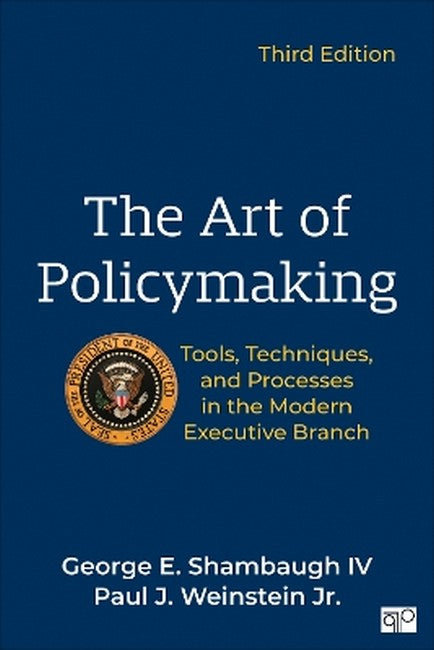Dr. George E. Shambaugh, IV is Professor of International Affairs and Government at the Edmund A. Walsh School of Foreign Service, Director of the Masters of Science in Foreign Service Program, and former chairman of the Department of Government at Georgetown University. He holds a Ph.D. and M. Phil. in Political Science, and an M.A. in International Affairs from Columbia University, as well as a B.A. in Government and Physics from Oberlin College. His research focuses on international political economy, international politics, foreign policy, and the environment. Dr. Shambaugh is the author of Oracles, Heroes or Villains: Economic Policymakers, National Politicians, and the Power to Shape Markets (Cambridge 2019), States, Firms, and Power: Successful Sanctions in U.S. Foreign Policy (SUNY, 1999), co-author of the first and second editions of The Art of Policymaking: Tools, Techniques, and Processes in the Modern Executive Branch (Longman, 2003, Sage 2016), co-editor of Anarchy and the Environment: The International Politics of Common Pool Resources (SUNY, 1999), and co-editor of three issues of Taking Sides: Clashing Views on Controversial Issues in American Foreign Policy (McGraw-Hill, 2006, 2008, 2010). His articles have appeared in a range of journals, including the PLoS One, Sustainability, American Journal of Political Science, International Studies Quarterly, The Journal of Peace Research, Review of International Studies, Analyses of Social Issues and Public Policy, International Politics, Environmental Politics, International Interactions, and Security Dialogue. He has received grants and awards from the National Science Foundation, the Smith Richardson Foundation, the Social Science Research Council, the MacArthur Foundation, the International Studies Association, the American Political Science Association, and the Oberlin Alumni Foundation, and he has been a MacArthur Foundation and Dwight D. Eisenhower/Clifford Roberts Fellow. Paul J. Weinstein, Jr. is the Cofounder and Director of the Graduate Program in Public Management at Johns Hopkins University. He also directs the schools Masters program in Nonprofit Management. He holds an M.A. in International Affairs from Columbia University and a B.S. in Foreign Service from Georgetown University. A veteran of two presidential administrations, he was senior adviser to the National Commission on Fiscal Responsibility and Reform (Simpson-Bowles), which President Obama created to address the nation's mid- and long-term fiscal challenges. Weinstein formerly served as special assistant to the president and chief of staff of the White House Domestic Policy Council and then later as Senior Advisor for Policy Planning to Vice President Gore during the Clinton Administration. Before that, Weinstein served as a senior legislative aide to then-Representative C. Thomas McMillen (D-MD) and then-Senator Albert Gore, Jr. (D-TN). Since 2001, Weinstein has served as a senior fellow at the Progressive Policy Institute, where he was chief operating officer for five years. He currently serves on the organization's advisory board. He also consults for the IntraFi Network and is the primary author of its quarterly bank survey. He has advised numerous elected officials, including former governors Jennifer Granholm and Christine Gregoire, and has worked for or advised five presidential candidates. Weinstein has taught at Johns Hopkins University since 2003 and has also lectured at Columbia University and Georgetown University. He is co-author of the first and second editions of The Art of Policymaking: Tools, Techniques, and Processes in the Modern Executive Branch (Longman, 2003, Sage 2016). He has written chapters in a number of other books, and his writing has also appeared in USA Today, The Atlantic, The Boston Globe, The Baltimore Sun, CNN, New York Newsday, Forbes, Investor's Business Daily, San Francisco Chronicle, New York Daily News, and Politico, among others.
Request Academic Copy
Please copy the ISBN for submitting review copy form
Description
Chapter 1: Why the Policymaking Process Matters PART I. THE POLICYMAKERS Chapter 2: The White House Policy Councils Chapter 3: The White House Staff Chapter 4: Agencies and Policy Implementation Chapter 5: Policy Management PART II. TOOLS OF THE TRADE Chapter 6: Policymaking Memoranda Chapter 7: Policy Implementation Tools Chapter 8: The State of the Union and the Budget Process Chapter 9: Legislative Clearance and Coordination: SAPs, LRMs, and Other Policy Acronyms Chapter 10: Polling and the Policymaking Process Chapter 11: Communicating and Marketing Policy PART III. CASE STUDIES Chapter 12: Social Policymaking: Welfare Reform During the Clinton Administration Chapter 13: Economic Policymaking I: The Clinton Economic Plan Chapter 14: Economic Policymaking II: The Simpson-Bowles Commission Under President Obama Chapter 15: Security Policymaking I: Desert Shield and Desert Storm Under George H. W. Bush Chapter 16: Security Policymaking II: The Surge and Iraq War Under George W. Bush Chapter 17: Congress and the Executive Branch: Yemen Policy during the Trump and Biden Administrations PART IV. SCENARIOS Chapter 18: Practice Scenarios Glossary

